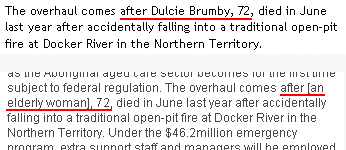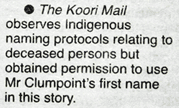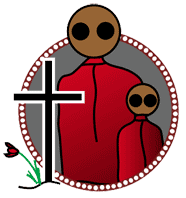Morning Again as Tradition Dies Slowly Rar
People
Distressing Business organization: Mourning an Aboriginal decease
The Ancient tradition of non naming a dead person tin can have bizarre implications. Pitiful business organization includes whole families, affects work and tin last for days.
Shut this

Wishing y'all knew more about Aboriginal civilisation? Search no more.
Get key foundational knowledge about Ancient culture in a fun and engaging way.
This is no ordinary resource: Information technology includes a fictional story, quizzes, crosswords and even a treasure hunt.
Stop feeling bad about not knowing. Make information technology fun to know ameliorate.
Sold! Show me how No, thank you
Why can't you lot name a expressionless Ancient person?


Many Aboriginal films, books or websites warn Aboriginal people that they might show images of Indigenous people who have passed away. But some don't. Why is this so?
The tradition not to depict dead people or vox their (first) names is very old [4]. Traditional police beyond Australia said that a dead person'south name could not be said considering yous would recall and disturb their spirit. After the invasion this law was adjusted to images as well.
Today these strict laws are generally not followed where colonisation offset happened, like on Commonwealth of australia's east coast and in the southern parts of the country.
In the Northern Territory, where traditional Aboriginal life is stronger and left more intact, the tradition of not naming the dead is still more prevalent.
Today naming protocols differ from identify to identify, community to community [v] and information technology is often a personal decision if names and images of a deceased Aboriginal person can be spoken or published.
Even in places where, traditionally, the names of deceased people are not spoken or written, families and communities may sometimes decide that circumstances permit the names of their deceased loved ones to be used.
Substitute names
In some areas, families may determine that a substitute name such as 'Kumantjayi', 'Kwementyaye', 'Kunmanara' or 'Barlang' may be used instead of a deceased person'south first name for a menstruum. This is also known as a 'bereavement term'.
For example, 'Kumantjayi Perkins' is now increasingly referred to once again equally the late 'Charles Perkins' [v].
Story: Not allowed to say 'Tuesday'
A reader of the ABC website recalls how substitute names tin make everyday life more complicated [6].
"In one community that I had associations with in cardinal Australia white officials in the 1930's and 40's had given many people 'white' names based on the day of the week on which they were born.
"When I was there in the 1970'due south several of these people had recently died.
"This acquired problems when children at school were reciting the days of the calendar week. The word 'Kwementyaye' was used locally in place of a name that couldn't exist used. The week at school appropriately became 'Monday, Kwementyaye, Wednesday, Kwementyaye, Kwementyaye, Kwementyaye, Sunday'. Within a couple of years, though, all of the days of the week could be freely used again."
Sorry business organization
When Aboriginal people mourn the loss of a family unit member they follow Aboriginal death ceremonies, or 'pitiful business organisation'. Aunty Margaret Parker from the Punjima people in northward-west Western Australia describes what happens in an Aboriginal community when someone dies.

"A cultural practise of our people of great importance relates to our attitude to death in our families. Similar when we take someone passed away in our families and not fifty-fifty our own shut families, the family belongs to us all, you know. The whole community gets together and shares that sorrow inside the whole community."
"It don't have to exist a close family unit. We say information technology is close because of our kinship ties and that means it'south family. Nosotros all get together till that funeral, till we put that person away. So every time someone comes into boondocks whom we haven't seen, that could be ii or 3 days after we get the bad news, we all become together and meet that person, nosotros have to drop what we're doing and get together."
"We have to cry, in sorrow, share our grief by crying and that's how we interruption that [grief], past sharing together every bit a customs. This is an of import aspect of our culture. And this is how we are brought up. I see it is lacking in a lot of other towns where we go. Nosotros become there to meet people and to share our sorrows and the white fashion of living in the town is breaking our culture."
"And a lot of towns you lot go to for funerals, want to do their own little individual things, instead of dropping what they're doing to get together to meet the people coming in from out of boondocks. The family has to sit down in 1 house, or one area, so people know that they accept to go direct into that place and run into up. Nosotros go and pay our respects. You supposed to just sit down and meet, eat together, share, until that body is put abroad, you know. Afterwards, we do whatever nosotros want to do, subsequently we leave that certain family..."
"Present, people simply come up and milk shake easily, want to shake hands all the time. To me it's pain, because we all know and nosotros grew upward in our civilisation system and that means we should cover others to share the sorrow, men and women." [8]
We own our grief and allow it to heal slowly.
— Miriam-Rose Ungunmerr-Baumann, Aboriginal activist, educator and creative person [9]
Yolnu elderberry Djambawa Marawili from Arnhem State in the NT explains how funerals strengthen family ties and relationships.
"When the funerals are held here in the homelands the ceremonies all come out. It is really very important that the kinship structures are laid on, the patterns and designs are all there, we always utilize them, the stories beyond this country we e'er share to the children and also to tell the other groups that are coming to bring together with us, our neighbours, yothu yindi [Yolngu for "child and mother"] or märi gutharra ["grandmother and grandchild"] they are "title-y" connected. That'due south why they always learn when we accept närra affair [important ceremony] or when we have expiry, that'southward when we get together. And information technology goes forth, it's telling usa that we are really "title-y" connected like in a märi/gutharra yothu/yindi." [ten]
Ceremonies and mourning periods last days, weeks and even months depending upon the behavior of the language grouping and the social condition of the deceased person. But time is as well essential in the healing procedure. "When a relation dies, we wait a long time with the sorrow. We own our grief and allow it to heal slowly," says Elderberry Miriam-Rose Ungunmerr-Baumann, an Aboriginal activist, educator and artist from the Northern Territory, renown for the concept of deep listening (dadirri). [9]
Burials can also exist delayed due to family unit disputes concerning the origin of the person (which relates to where they tin can exist buried), or the inheritance of their land and property.
Aboriginal children oftentimes tin have time off schoolhouse for the duration of the ceremonies, notwithstanding if their family unit receives any Government payments, such equally Centrelink, they cannot stay away for more than a calendar week in order for the family unit not to lose their entitlement. [11]
Note that it is culturally inappropriate for a non-Aboriginal person to contact and inform the side by side of kin of a person's passing. This breach of cultural protocol may crusade significant distress for Ancient families continued to the person whom has passed.
Fact
In Ancient gild when somebody passes away, the family moves out of that house and another moves in. Families swap houses [12]. Some families live in sad camps some distance away.
Story: Too many deaths: "You can't have it anymore"
Wiradjuri woman Jenny Munro has seen far too many deaths. She describes the price on Aboriginal communities [thirteen]:
"We are suffering from then many and continuing deaths brought about by injustice – deaths in custody, youth suicide, inequality in healthcare provision and the like, and each expiry compounds with another one and another ane and then we don't accept a take chances to grieve each loss individually.
"You get to a indicate where you can't take whatever more and many of our people withdraw from interacting with other members of their community considering it's too heartbreaking to sentry the deaths that are happening now in such large numbers.
"The deaths are a result of the oppression nosotros are facing under this system. In 227 years we have gone from the healthiest people on the planet to the sickest people on the planet."
References
View article sources (xiii)
[1] 'Boost in funds for outback nursing homes', The Australian, 22/9/2008
[2] Printing Cuts, NIT, ii/10/2008 p.26
[3] 'Palm rallies to aid family unit', Koori Postal service 453 p.7
[4] 'The story of black Australia', WAToday.com.au, 9/10/2008
[5] [5a] Personal communication with Kirstie Parker, editor Koori Mail
[6] 'Ancient leader'south face to gaze from high-rise', www.abc.internet.au/news/stories/2010/09/15/3012199.htm, accessed 23/10/2010
[7] 'Sorry Business - Grief and Loss', brochure, Indigenous Substance Misuse Health Promotion Unit 2004
[8] 'Karijini Mirlimirli', Noel Olive, Fremantle Arts Center Press 1997 pp.126
[9] [9a] 'A 60,000-year-old cure for depression', BBC Travel 30/9/2019
[10] 'Ceremonial Economy: An Interview with Djambawa Marawili AM', Working Papers 2/8/2015
[11] Daniel Wilkinson, email communication, 8/2015
[12] 'The NT Intervention - Six Years On', NewMatilda.com 21/6/2013
[13] 'An Interview With Jenny Munro', Gaele Sobott 25/1/2015, gaelesobott.wordpress.com/2015/01/25/an-interview-with-jenny-munro/, retrieved 2/2/2015
Cite this folio
Korff, J 2021, Sorry Business: Mourning an Aboriginal death, <https://www.creativespirits.info/aboriginalculture/people/mourning-an-ancient-death>, retrieved 8 May 2022
Artistic Spirits is a starting signal for everyone to acquire almost Aboriginal culture. Please use master sources for academic work.
Source: https://www.creativespirits.info/aboriginalculture/people/mourning-an-aboriginal-death
0 Response to "Morning Again as Tradition Dies Slowly Rar"
ارسال یک نظر